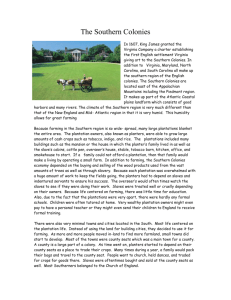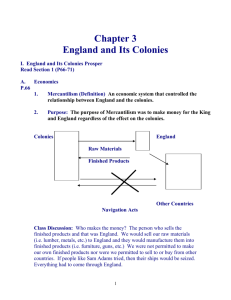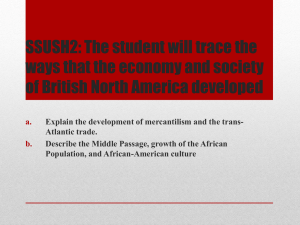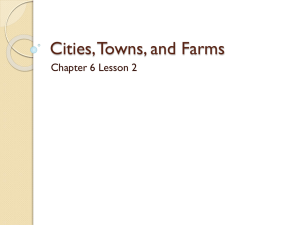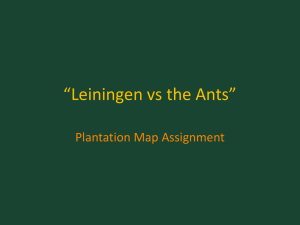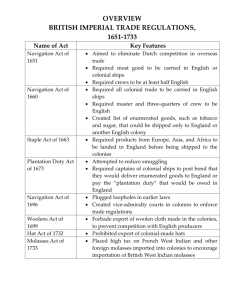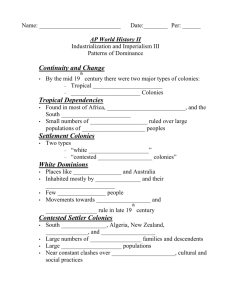A pamphlet on the importance of the African trade, 1745
advertisement
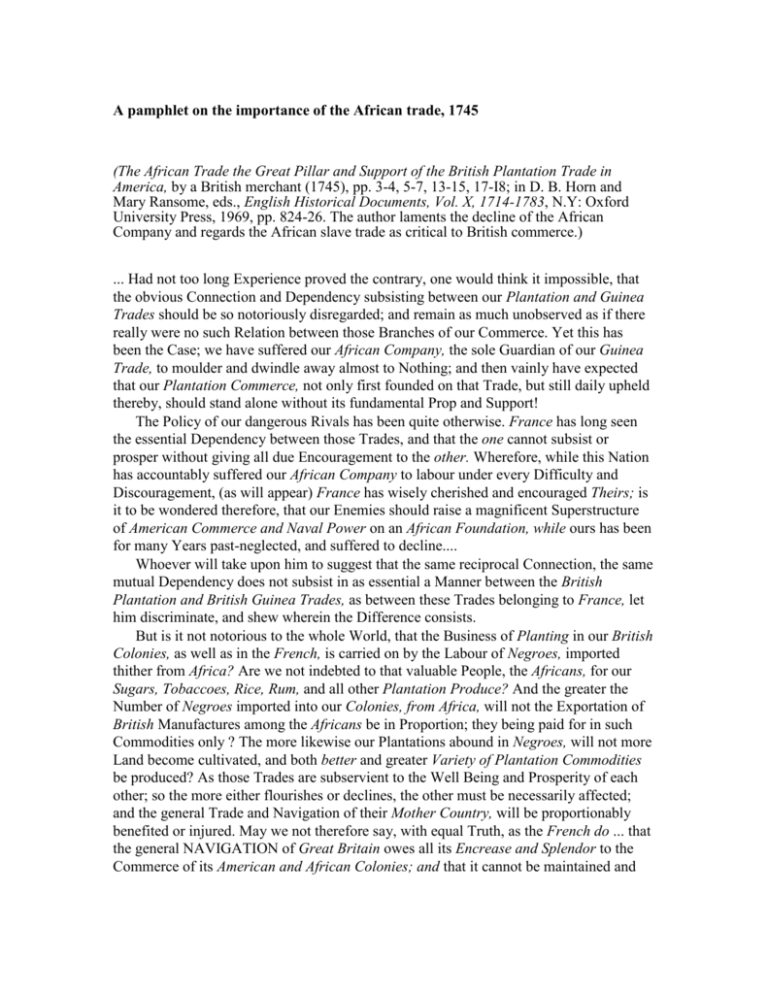
A pamphlet on the importance of the African trade, 1745 (The African Trade the Great Pillar and Support of the British Plantation Trade in America, by a British merchant (1745), pp. 3-4, 5-7, 13-15, 17-I8; in D. B. Horn and Mary Ransome, eds., English Historical Documents, Vol. X, 1714-1783, N.Y: Oxford University Press, 1969, pp. 824-26. The author laments the decline of the African Company and regards the African slave trade as critical to British commerce.) ... Had not too long Experience proved the contrary, one would think it impossible, that the obvious Connection and Dependency subsisting between our Plantation and Guinea Trades should be so notoriously disregarded; and remain as much unobserved as if there really were no such Relation between those Branches of our Commerce. Yet this has been the Case; we have suffered our African Company, the sole Guardian of our Guinea Trade, to moulder and dwindle away almost to Nothing; and then vainly have expected that our Plantation Commerce, not only first founded on that Trade, but still daily upheld thereby, should stand alone without its fundamental Prop and Support! The Policy of our dangerous Rivals has been quite otherwise. France has long seen the essential Dependency between those Trades, and that the one cannot subsist or prosper without giving all due Encouragement to the other. Wherefore, while this Nation has accountably suffered our African Company to labour under every Difficulty and Discouragement, (as will appear) France has wisely cherished and encouraged Theirs; is it to be wondered therefore, that our Enemies should raise a magnificent Superstructure of American Commerce and Naval Power on an African Foundation, while ours has been for many Years past-neglected, and suffered to decline.... Whoever will take upon him to suggest that the same reciprocal Connection, the same mutual Dependency does not subsist in as essential a Manner between the British Plantation and British Guinea Trades, as between these Trades belonging to France, let him discriminate, and shew wherein the Difference consists. But is it not notorious to the whole World, that the Business of Planting in our British Colonies, as well as in the French, is carried on by the Labour of Negroes, imported thither from Africa? Are we not indebted to that valuable People, the Africans, for our Sugars, Tobaccoes, Rice, Rum, and all other Plantation Produce? And the greater the Number of Negroes imported into our Colonies, from Africa, will not the Exportation of British Manufactures among the Africans be in Proportion; they being paid for in such Commodities only ? The more likewise our Plantations abound in Negroes, will not more Land become cultivated, and both better and greater Variety of Plantation Commodities be produced? As those Trades are subservient to the Well Being and Prosperity of each other; so the more either flourishes or declines, the other must be necessarily affected; and the general Trade and Navigation of their Mother Country, will be proportionably benefited or injured. May we not therefore say, with equal Truth, as the French do ... that the general NAVIGATION of Great Britain owes all its Encrease and Splendor to the Commerce of its American and African Colonies; and that it cannot be maintained and enlarged otherwise than from the constant Prosperity of both those Branches, whose Interests are mutual and inseparable? Whatever other Causes may have conspired to enable the French to beat us out of all the Markets in Europe in the Sugar and Indigo Trades, etc. the great and extraordinary Care they have taken to cherish and encourage their African Company, to the End that their Plantations might be cheaply and plentifully stocked with Negroe Husbandmen, is amply sufficient of itself to account for the Effect; for this Policy, they wisely judged, would enable them to produce those Commodities cheaper than we, who have suffered the British Interest to decline in Africa, as that of the French has advanced; and when they could produce the Commodities cheaper, is it at all to be admired that they have undersold us at all the foreign Markets in Europe, and hereby got that most beneficial Part of our Trade into their own Hands ? As their great Care and our great Neglect of the African Trade, has for many Years past given France the Advantage over us in Planting; so while the same Cause continues, Is it not impossible, in the Nature of Things that the Effect should cease, and our Trade return to its former flourishing State? All other Measures as they hitherto have, so always will prove only temporary Expedients, not effectual Restoratives: They have none of them struck at the Root of the Evil; nor is it possible to work a thorough Cure any other way, but by enabling the African Company effectually to maintain and support British Rights and Privileges on the Coast of Africa against the Encroachments of the French, and all other Rivals; and in Consequence thereof, by stocking our own Plantations with greater Plenty of Negroes, and at cheaper Rates than our Rivals would, in such Case, be able to do.... As Negroe Labour hitherto has, so that only can support our British Colonies, as it has done those of other Nations. It is that also will keep, them in due Subserviency to the Interest of their Mother Country; for while our Plantations depend only on Planting by Negroes, and that of such Produce as interferes only with the Interests of our Rivals not of their Mother-Country, our Colonies can never prove injurious to British Manufactures, never become independent of these Kingdoms, but remain a perpetual Support to our European Interest, by preserving to us a Superiority of Trade and Naval Power. But if the whole Negroe Trade be thrown into the Hands of our Rivals, and our Colonies are to depend on the Labour of White Men to supply their Place, they will either soon be undone, or shake off their Dependency on the Crown of England. For White Men cannot be obtained near so cheap, or the Labour of a sufficient Number be had for the Expence of their Maintenance only, as we have of the Africans. Has not long Experience also shewn that White Men are not constitutionally qualified to sustain the Toil of Planting in the Climates of our island Colonies like the Blacks? Were it possible however, for White Men to answer the End of Negroes in Planting, must we not drain our own Country of Husbandmen, Mechanicks and Manufacturers too? Might not the latter be the Cause of our Colonies interfering with the Manufactures of these Kingdoms, as the Palatines attempted in Pensilvania? In such Case indeed, we might have just Reason to dread the Prosperity of our Colonies; but while we can be well supplied with Negroes, we can be under no such Apprehensions; their Labour will confine the Plantations to Planting only; which will render our Colonies more beneficial to these Kingdoms than the Mines of Peru and Mexico are to the Spaniards. Doctor Davenant tells us, that in the Time of King CHARLES 11. our Merchants, interested in the American Trade, made a Representation to that King, setting forth, that by a just Medium, they made it appear, that the Labour of an hundred Negroes was, at that Time of Day, 1600l. per Annum Profit to this Nation, deducting therefrom the Amount of the Value of what we consume in Plantation Produce. It was then estimated there were no more than 100,000 Negroes in America; but the most experienced judges now do not rate them at less than 300,000: So that if we reckon them of no more Worth to Great Britain now than at that Time, and estimate the Value of our Home Consumption of Plantation Commodities at the highest Pate, the annual Gain of the Nation by Negroe Labour will fall little short of Three Million per Annum: And it is to be hoped we shall not sacrifice such an Annuity rather than give all just and reasonable Encouragement for the due Support of our African Company, which has been the FOUNDANON of such Profit to these Kingdoms! ... Our -African Trade had its Being before we had any Plantations in the West Indies: From the Reign of Queen Elizabeth our Merchants separately, or in joint Stocks, prosecuted this Trade till the Commencement of the present Company. Nor have the Struggles, Difficulties, Hazards, and Expences of this present Corporation, first to establish their Trade on a good Footing, and since, to preserve and maintain it to Posterity, been any way inferior to the first Adventurers in our American Settlements: But to put this Matter in its true Light, would take a Volume by itself...

